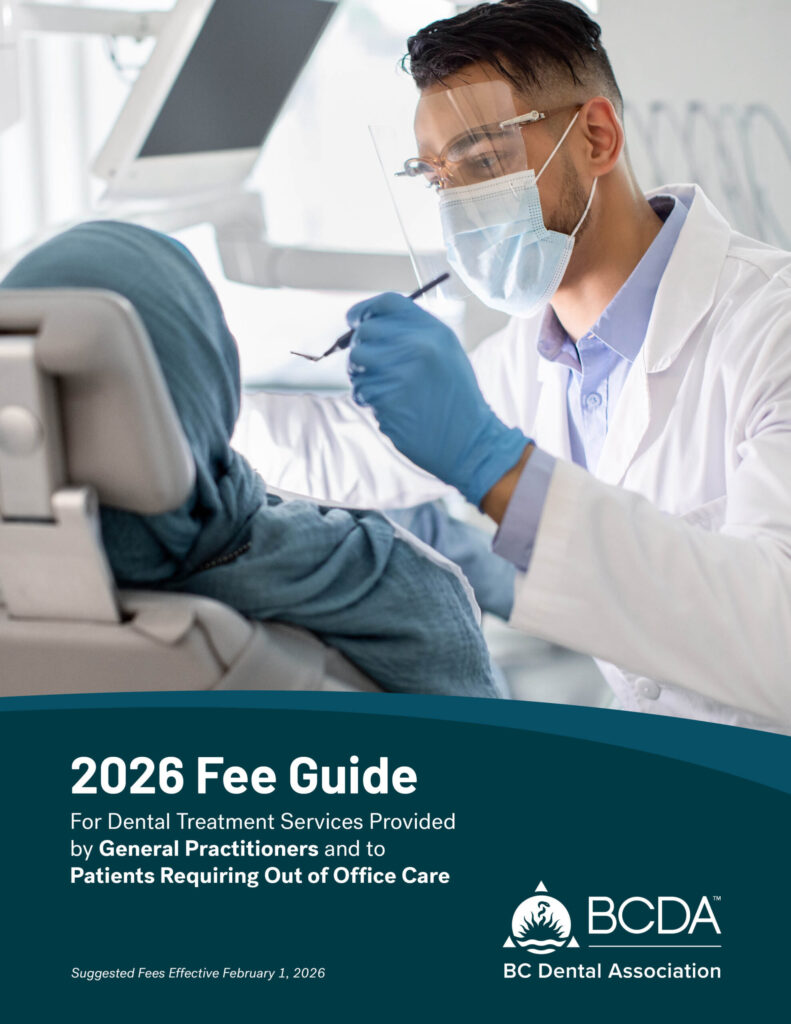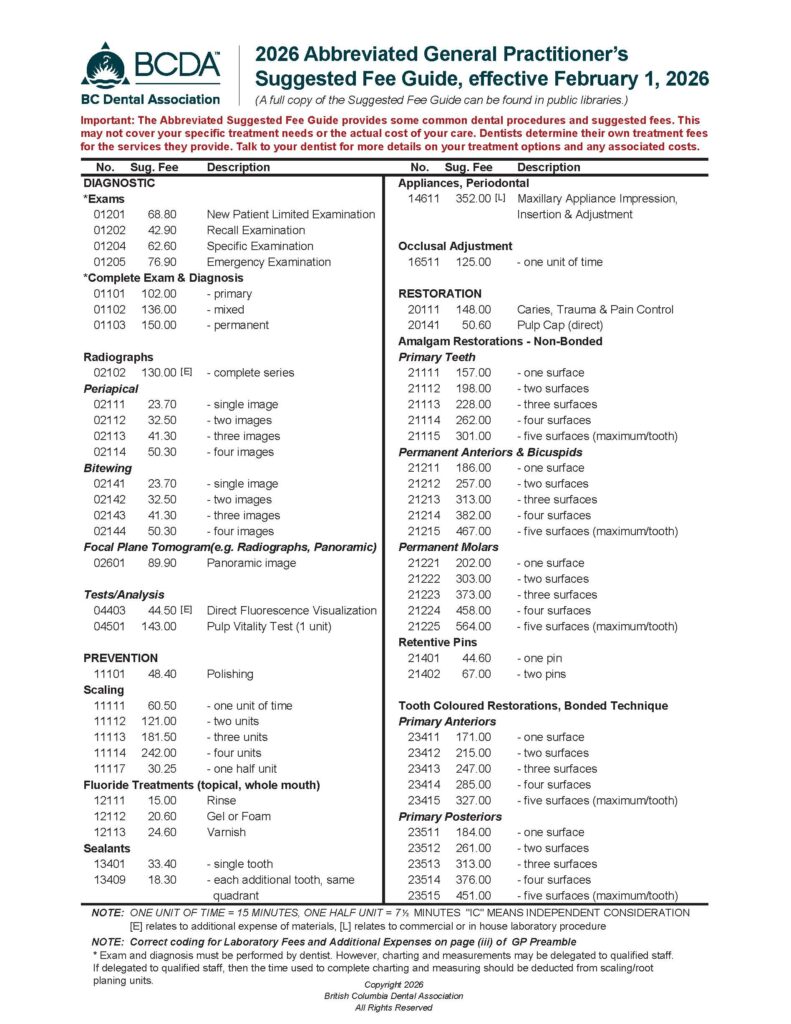Home / Public Education / Dental Costs in BC
The British Columbia Dental Association (BCDA) produces an annual suggested fee guide for dentists in BC. This document outlines over 1,400 dental codes and code descriptors related to specific elements of dental treatment. It also provides suggested fees that serve as a guide only; dentists are not required to follow the guide or any fee schedule.
Many dental plan carriers will base plan coverage on fees and codes within this guide. In some cases the coverage is based on previous year’s guides (going back a year or more). Note: Dental plan providers do not work with the BCDA to develop the guide.
No. While many dentists will follow a number of fees within the guide, there is no requirement to do so. Dental offices consider a number of variables when determining costs for their office.
There is no requirement for dentists to charge the suggested fees outlined in the dental fee guides. Dentists determine costs for their office based on the factors influencing their individual practice.
A print copy of the suggested fee guide can be found in main public libraries (PDF) for members of the public and non-member dentists—this is the same print copy sent to all BCDA member dentists in BC. The BCDA does not produce an electronic version of the fee guide for the public or non-member dentists. If patients have questions related to a specific code, they can inquire with their dentist directly, or contact the BCDA.
We remind patients that this document is only a guide and dentists are not required to charge the suggested fees outlined.
The fee guide is a very complex document, with more than 1,400 codes representing a wide range of dental procedures for the prevention and treatment of oral disease. Due to the technical nature of the guide, patients often require some interpretation of the descriptors in order to understand the content. Patients should discuss any questions related to their recommended treatment options or the cost of treatment with their dentist.

The Abbreviated General Practitioner’s Suggested Fee Guide is intended to provide British Columbians with some information on common dental procedure codes and the suggested fee guide. This is intended for reference only and may not reflect the specifics of your treatment and associated costs.
Note:
The abbreviated fee guide comprises of a list of common dental procedures along with respective procedure codes and suggested fees.
Note: One Unit of time = 15 minutes, One Half Unit = 7 1/2 minutes
+E refers to additional expense for materials; +L refers to commercial or in house laboratory costs.
Talk to your dentist. Discuss all of your treatment options with your dentists and the associated costs before proceeding with treatment.
Ask if your dental office follows the suggested fee guide. A dental office may bill some, or all codes, based on the suggested fee guide. Check with your office to make sure you are clear about all the costs of your treatment before proceeding. Request a written estimate for complex procedures.

It is important to understand that your dental office does not know the details of your dental plan coverage; this information is protected by the Personal Information Protection Act. However, your dental office can work with you to determine what services may be covered.
Before you visit the dentist always ensure you have the most recent information on your plan and ensure you share any relevant information with your dental office, such as changes to your plan, any recent claims and/or past treatment that may affect your coverage.
Once you review, discuss and agree on a treatment plan with your dentist, your dental office can submit a predetermination to your plan provider. A predetermination provides you with an estimate of what costs your dental plan will cover and what you will be responsible for. Please be aware this is not a guarantee of coverage.
Important Note: A predetermination is usually valid for a fixed period of time (i.e. six months to a year) however, it is based on available coverage at the time the predetermination is submitted and approved. Therefore, it is important to be aware that if, between the time a predetermination is obtained and the time you receive treatment there are any changes and/or any limits reached on your plan, the final amount of the treatment your plan covers may change. If you have any doubts, reconfirm coverage with your plan provider before your treatment takes place.
Confirm if your dental office offers assignment of benefits. This is a service offered by some dental offices whereby they submit a claim to your plan provider for the covered portion of care; you then pay for any costs not covered. Some offices require patients to pay for the full cost of treatment (this is called non-assignment) and provide you with a completed claim form for you to submit to your dental plan provider to reimburse you directly. This is not uncommon in specialists’ offices. Speak to your dental office before treatment begins so you understand what costs you will be responsible for at the time of care.
Your dental office may incur various expenses in preparation for your treatment. In such cases, your dental office may require a deposit to cover some of these initial costs.
The fee that your dental office charges for a particular service/treatment may be different (higher or lower) from the rate your dental plan provider reimburses. You are responsible to cover any costs not covered by your plan.
It is important to make treatment decisions based on your dental health needs, not on what your dental plan covers.
BCDA uses cookies to enhance member experience and develop relevant content. By continuing to browse the site, you are agreeing to our use of cookies. Read more in our Privacy Policy & Terms of Use.